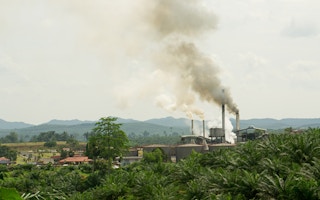Singapore-listed palm oil trader Golden Agri Resources (GAR) announced on Friday it will implement its forest conservation policy (FCP) across all its third party suppliers - a move that has been welcomed by environmental group Greenpeace.
To continue reading, subscribe to Eco‑Business.
There's something for everyone. We offer a range of subscription plans.
- Access our stories and receive our Insights Weekly newsletter with the free EB Member plan.
- Unlock unlimited access to our content and archive with EB Circle.
- Publish your content with EB Premium.
On the sidelines of the firm’s financial results announcement, the palm oil trading company said it will implement initiatives that will ensure palm oil for its downstream operations are in line with GAR’s FCP. This meant GAR is committed to no deforestation palm oil in its entire supply chain.
Previously, the firm’s forest conservation policy - announced in 2011 - only applied to concessions it owned but not to producers it supplied from.
GAR told Eco-Business that ensuring traceability is more challenging in the downstream business, as compared to its upstream operations, where more than 90 per cent of the fresh fruit bunches come from the company’s plantations.
Its FCP stated the firm will not develop palm oil on high carbon stock forests, high conservation value forest areas and peatlands.
“We take a pragmatic approach towards the growing market demand for traceable, deforestation free palm oil and are taking steps to achieve traceability that makes business sense. It has to be practical and commercially viable,” a GAR spokesperson told Eco-Business.
The company espoused collaboration among different stakeholders as the key to achieve solutions for sustainable palm oil, adding that it “will engage constructively with leading palm oil players to share, learn and implement best practices for the upstream and downstream business”.
Palm oil’s downstream industry mainly includes the refining of crude palm oil into edible oils and fats, which is used by companies in food manufacturing as well as in personal care products.
“
We take a pragmatic approach towards the growing market demand for traceable, deforestation free palm oil and are taking steps to achieve traceability that makes business sense. It has to be practical and commercially viable
Golden Agri Resources spokesperson
GAR’s chief executive Franky Widjaja said the global demand for palm oil products has grown to 3 million tonnes per year, mainly for food consumption. “We envisage that palm oil demand will further grow, especially from the bio-energy sector. For example, the Indonesian government has announced to increase the usage of biofuel,” Widjaja added.
Companies like GAR and palm oil trader Wilmar are in the middle of the supply chain that link palm oil plantations to manufacturers such as Unilever, L’Oréal, Ferrero and Delhaize. These consumer companies have recently committed to clean up their supply chain from unsustainable palm oil production practices following global campaigns launched by Greenpeace and other environmental groups.
GAR committed to a FCP following global campaign by Greenpeace that calls for plantations, palm oil companies, traders, governments, and financiers to commit to a zero deforestation policy by 2020.
Greenpeace forest campaigner Annisa Rahmawati said GAR’s decision to follow fellow trader Wilmar International in its policy to eliminate deforestation in its supply chain, puts pressure to other palm oil producers and consumers to commit to forest protection.
“The next step means putting this commitment into practice: GAR must now ensure that all the palm oil it refines and trades is not contributing to deforestation, climate change and social conflicts,” Rahmawati commented.
Greenpeace reiterated its position that for palm oil to genuinely contribute to Indonesia’s development, the industry must make way for responsible palm oil production.
The group has recently launched an online petition urging personal care products maker Procter & Gamble to clean up its supply chain from unsustainable palm oil practices as new evidence has linked its products to palm oil plantations involved in forest fires and clearing of peatlands.

















